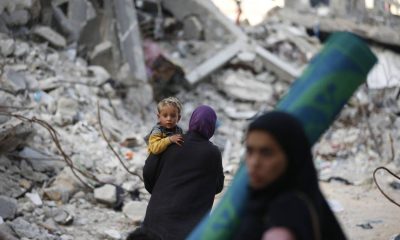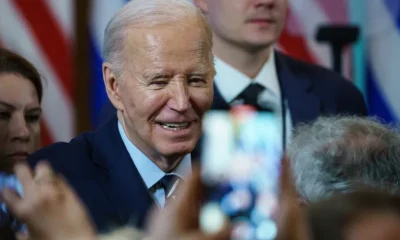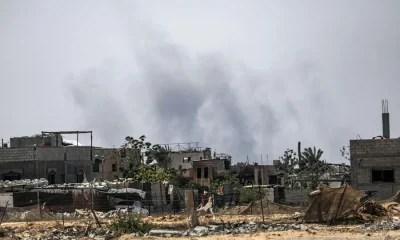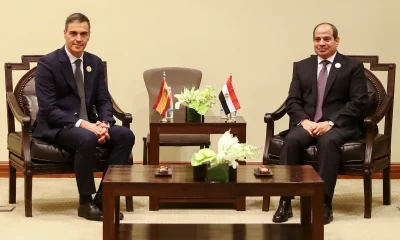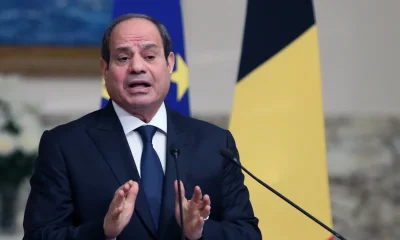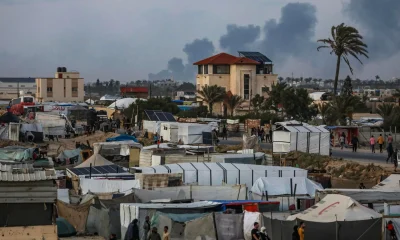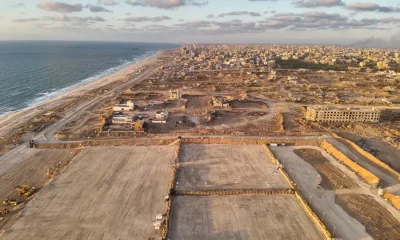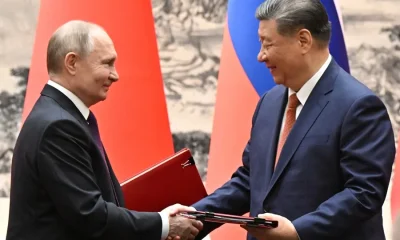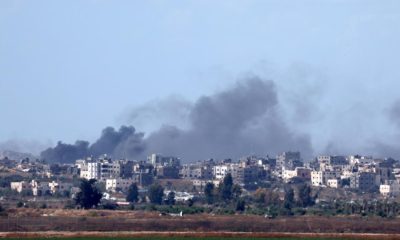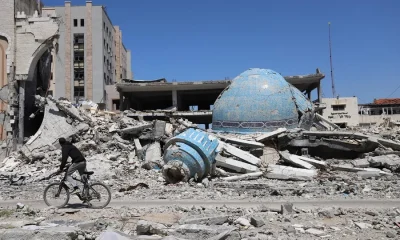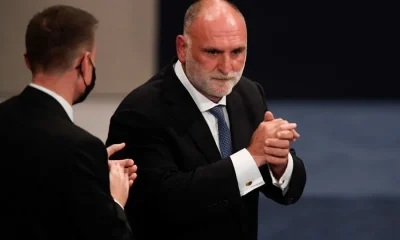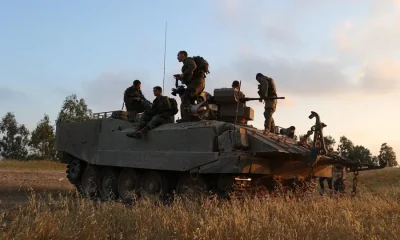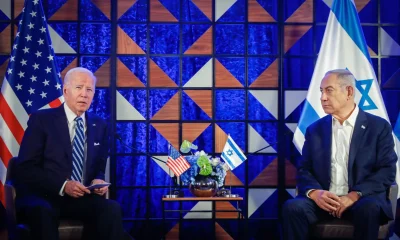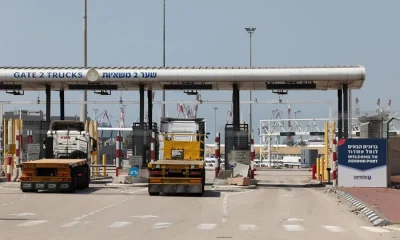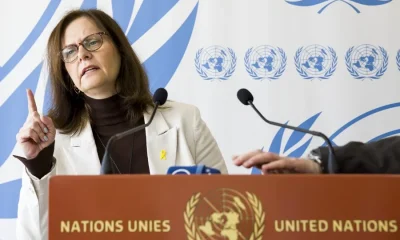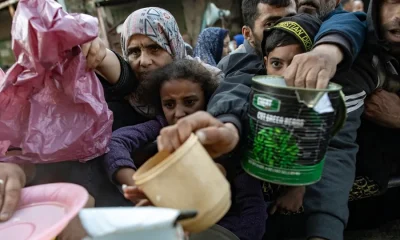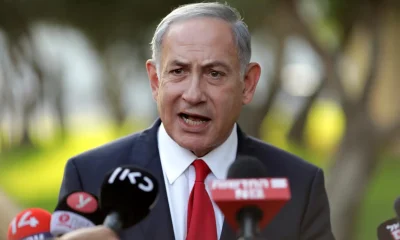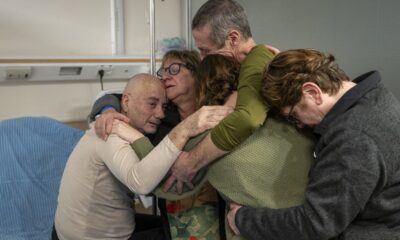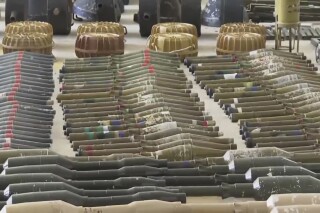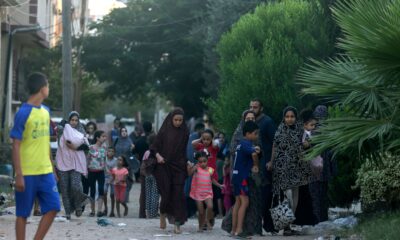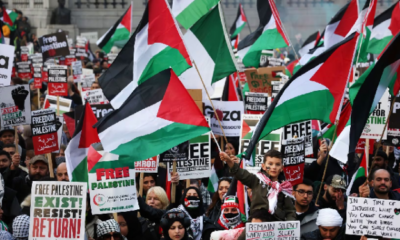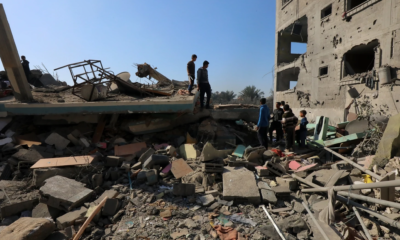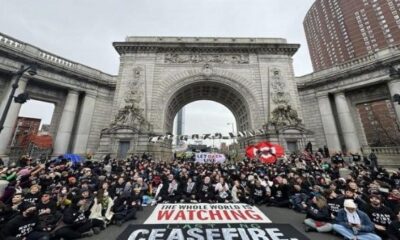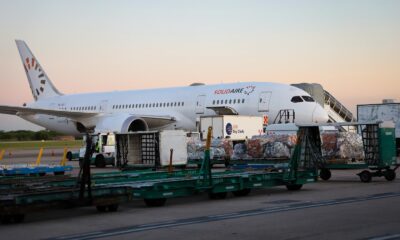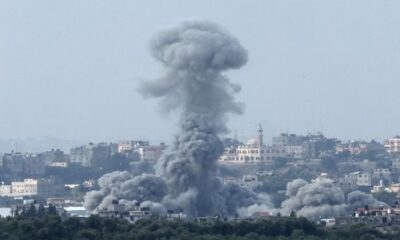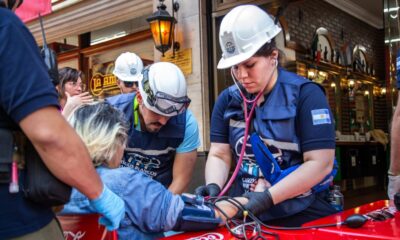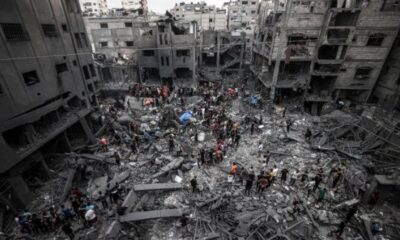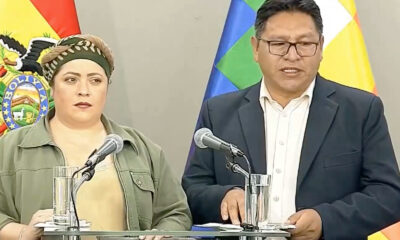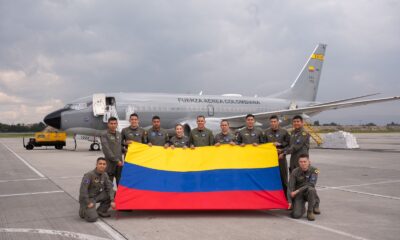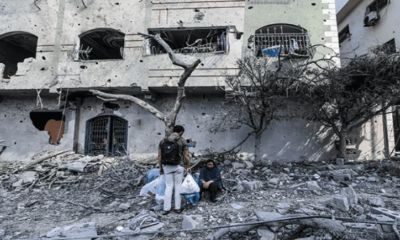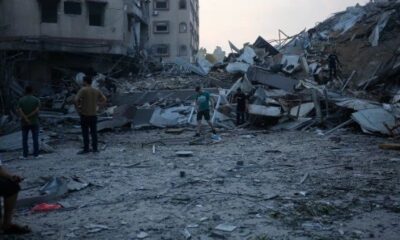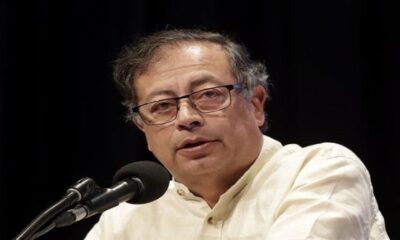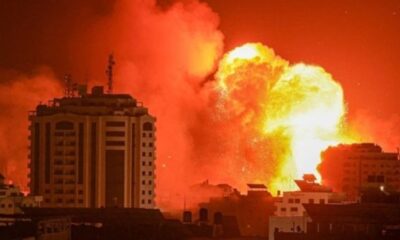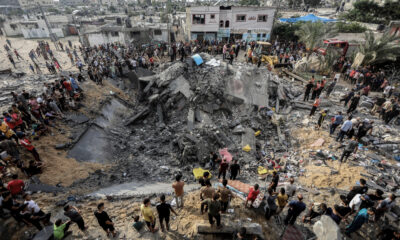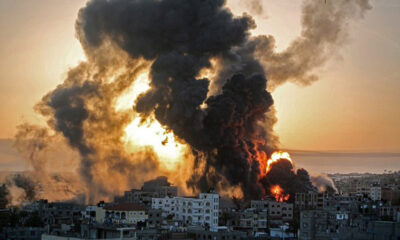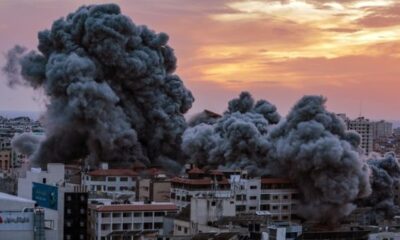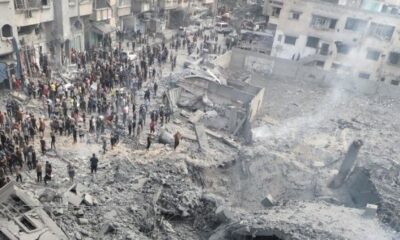International
Jamer Elder, UNICEF spokesman, from Gaza: “Children are as thin as paper”
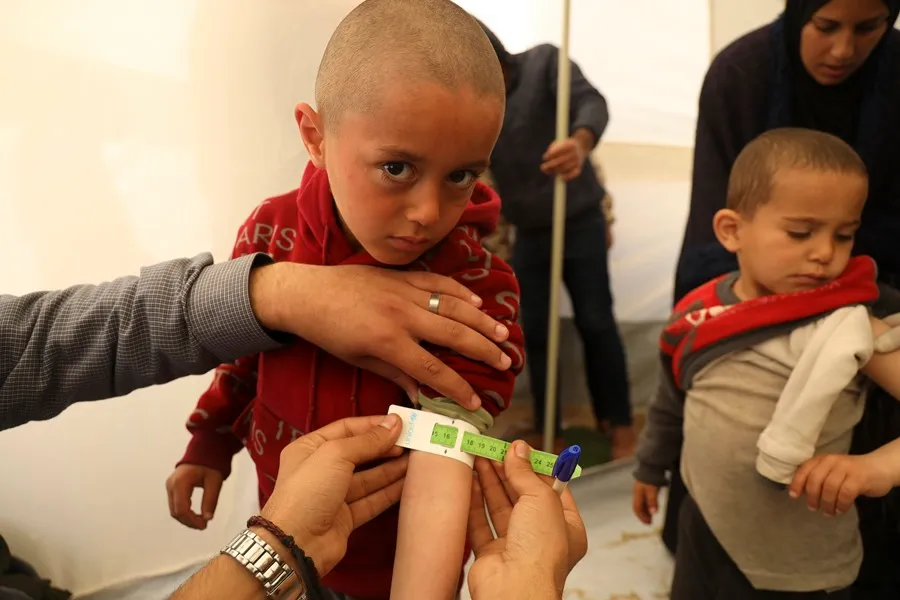
“Children are thin as paper due to malnutrition,” laments James Elder, UNICEF spokesman who is currently in the Gaza Strip, where he has been able to travel north and witness the famine that is already looming over his population and that has claimed the lives of 27 children.
“We are beginning to see how children die of hunger, in the crudest literal sense,” he said in a telephone interview with EFE from Rafah, after having visited the Kamal Adwan hospital, in the north of the enclave, and having contemplated the total devastation in Gaza City or Jan Yunis.
More than twenty babies have died from malnutrition and dehydration in the last month: “Children are as thin as paper, and mothers and grandmothers are tied to their beds, crying, begging them to endure one more day.”
“I have never seen in my 20 years at the United Nations, a place where the nutritional situation has worsened so much in such a short time, to the point where we have caused a famine,” explained Elder, who already entered the Strip last December in the middle of the war between Israel and the Islamist group Hamas.
Last week the UN published a report that establishes that half of the population of the Strip is at “imminent” risk of suffering catastrophic famine, while the enclave does not receive even half of the basic humanitarian aid it needs, much less in the north.
Hunger did not exist in Gaza six months ago and now, one in three children under the age of two suffers acute malnutrition – twice as much as last January – due to a crisis that is worsening at high speed, according to the UNICEF spokesman.
Precisely, the Commissioner General of the UN Agency for Palestinian Refugees (UNRWA), Philippe Lazzarini, denounced yesterday that Israel had communicated to the United Nations that it was not going to authorize more humanitarian convoys from UNRWA – which he accuses without convincing evidence of ties to Hamas – to the north, where hunger is already a reality.
The visit to the Kamal Adwan, in Beit Lahia – in the northern part of the enclave – has been one of the experiences that has most marked this humanitarian worker.
“People’s ability to survive has been destroyed; access to water and food has deteriorated as the bombings have continued. Fewer and fewer hospitals operate at a time when more and more children need medical attention,” Elder summarized about how the situation has worsened since his previous visit inside the enclave.
“The families have had to move again because of the fighting. The stress of leaving even more things behind, moving fewer and fewer belongings. I’ve never seen entire cities crumbled and annihilated,” he adds.
However, Elder sees a glimmer of hope, and that is that famine is “avoidable and reversible” since it has been provoked by man, and can still be solved with political will.
“Opening more ground access routes is a simple first solution,” he said.
At the moment Israel, after subjecting it to exhaustive controls, only allows the entry of humanitarian aid through two of the nine crossings in the Gaza Strip – Kerem Shalom and Rafah, bordering Egypt -, both in the south, so humanitarian agencies need security guarantees to be able to reach the north and convoys have frequently been subjected to attacks, in addition to the destruction of roads.
According to the Government of Gaza, controlled by Hamas, about 560 people have died in attacks on trucks or food warehouses or in incidents related to the distribution of aid, as happened on February 29 in the so-called “flour massacre”, in which 118 Gazans died and more than 700 were injured in a chaotic distribution of aid in Gaza City in which Israel admitted to having opened fire.
Elder acknowledged that the difficulties in distributing aid in the Gaza Strip are endless, nothing compared to the problems in other places of conflict such as Afghanistan, Somalia or Ukraine.
“It’s getting harder and harder to find words to describe what I see,” he lamented.
International
Police investigate deaths of Rob Reiner and wife as apparent homicide

The Los Angeles Police Department (LAPD) is investigating the deaths of Hollywood actor and filmmaker Rob Reinerand his wife as an “apparent homicide,” amid a wave of tributes to the director of classics such as When Harry Met Sally.
According to U.S. media reports on Sunday, Rob Reiner and Michele Singer Reiner were found dead at their Los Angeles mansion with what appeared to be stab wounds.
Several political figures shared messages of condolence following the reported deaths of the director of A Few Good Menand his wife.
While the LAPD did not officially confirm the identities of the victims, it stated that homicide detectives were dispatched to the Reiner residence.
“At this time, no additional details are available and the investigation into an apparent homicide is ongoing,” the Los Angeles Police Department said in a statement posted on social media.
LAPD Deputy Chief Alan Hamilton told reporters that no arrests have been made and that no individuals are currently being questioned as suspects.
“I’m not going to confirm whether anyone is being questioned at this moment or not. We are going to try to speak with as many family members as we can,” Hamilton said.
CNN reported that a family spokesperson confirmed the deaths of Reiner and his wife.
California Governor Gavin Newsom, former U.S. President Barack Obama, and former Vice President Kamala Harrisissued statements expressing their condolences.
International
U.S. and Mexico Reach Deal to Address Water Deficit Under 1944 Treaty
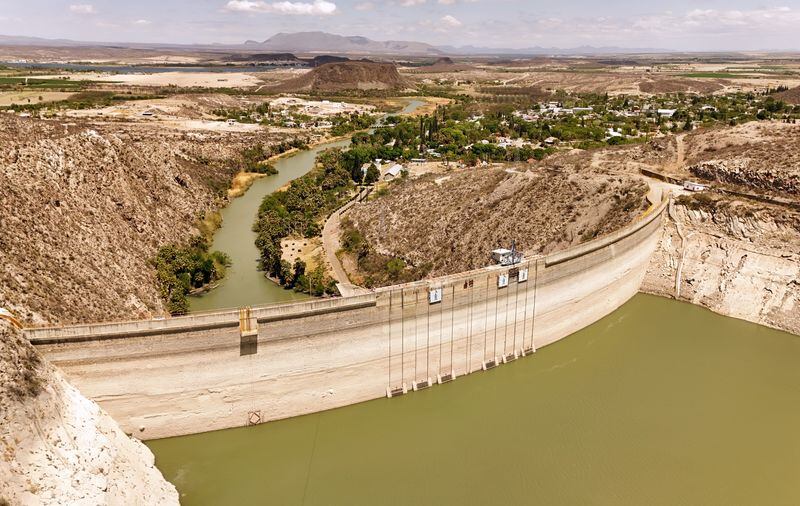
The United States and Mexico have reached an agreement to comply with current water obligations affecting U.S. farmers and ranchers and for Mexico to cover its water deficit to Texas under the 1944 Water Treaty, the U.S. Department of Agriculture said in a statement.
The department уточified that the agreement applies to both the current cycle and the water deficit from the previous cycle.
On Monday, U.S. President Donald Trump accused Mexico of failing to comply with the water-sharing treaty between the two countries, which requires the United States to deliver 1.85 billion cubic meters of water from the Colorado River, while Mexico must supply 432 million cubic meters from the Rio Grande.
Mexico is behind on its commitments. According to Washington, the country has accumulated a deficit of more than one billion cubic meters of water over the past five years.
“This violation is severely harming our beautiful crops and our livestock in Texas,” Trump wrote on Monday.
The Department of Agriculture said on Friday that Mexico had agreed to supply 250 million cubic meters of water starting next week and to work toward closing the shortfall.
Agriculture Secretary Brooke Rollins, quoted in the statement, said Mexico delivered more water in a single year than it had over the previous four years combined.
Trump has said that if Mexico continues to fall short of its obligations, the United States reserves the right to impose 5% tariffs on imported Mexican products.
Mexico’s Deputy Foreign Minister for North America, Roberto Velasco, said that a severe drought in 2022 and 2023prevented the country from meeting its commitments.
International
Several people shot in attack on Brown University campus

Several people were shot on Saturday in an attack on the campus of Brown University, in the northeastern United States, local police reported.
“Shelter in place and avoid the area until further notice,” the Providence Police Department urged in a post on X. Brown University is located in Providence, the capital of the state of Rhode Island.
U.S. President Donald Trump said on his social media platform Truth Social that he had been briefed on the situation and that the FBI was on the scene.
At 5:52 p.m. local time (11:52 p.m. GMT), Brown University said the situation was still “ongoing” and instructed students to remain sheltered until further notice.
After initially stating that the suspect had been taken into custody, Trump later posted a second message clarifying that local police had walked back that information. “The suspect has NOT been apprehended,” the U.S. president said.
-

 International4 days ago
International4 days agoWashington declares State of Emergency as atmospheric river brings severe flooding
-

 International4 days ago
International4 days agoU.S. to require five-year social media history from tourists under Visa Waiver Program
-

 Central America4 days ago
Central America4 days agoHonduras election crisis deepens as CNE president denounces intimidation attempts
-

 Central America4 days ago
Central America4 days agoOAS and EU urge honduran political actors to respect vote results and avoid unrest
-

 International4 days ago
International4 days agoCuba battles out-of-control dengue and chikungunya epidemic as death toll rises to 44
-

 International4 days ago
International4 days agoColombia says it would not reject Maduro asylum request as regional tensions escalate
-

 International2 days ago
International2 days agoSeveral people shot in attack on Brown University campus
-

 International4 days ago
International4 days agoEcuador on track for record violence as homicides hit highest level in Latin America again
-

 International4 days ago
International4 days agoSix ecuadorian soldiers jailed pending trial for alleged extrajudicial execution
-

 International7 hours ago
International7 hours agoPolice investigate deaths of Rob Reiner and wife as apparent homicide
-

 International2 days ago
International2 days agoU.S. and Mexico Reach Deal to Address Water Deficit Under 1944 Treaty
-

 Central America19 hours ago
Central America19 hours agoPanama seizes over three tons of drugs hidden in Caribbean port container
-

 Central America7 hours ago
Central America7 hours agoOAS urges swift recount in Honduras as election results remain uncertain

























